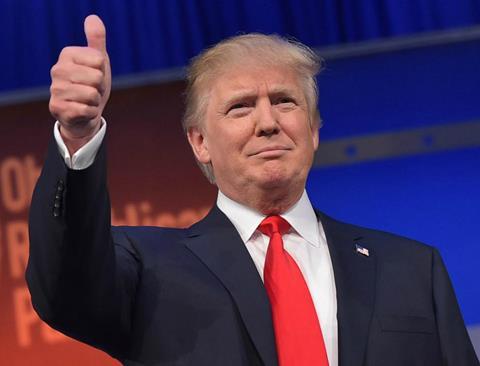Donald Trump's election to the US presidency could give commercial real estate a boost over the next couple of years, according to new research by Cushman & Wakefield, but only if his pro-business campaign promises are executed. The full enactment of restrictive trade policies might result in a net decline for the property industry, the report has warned.

The new research, called Trump: Impact on the US Economy & the Property Markets, makes it clear that the Republican candidate's election alone won't affect the real estate industry. Previous occasions where a president of a different party has entered the White House (1992, 2000, 2008) 'have generally not led to any immediate changes in property market fundamentals', the report said. 'Economic conditions are a far more important driver of commercial real estate markets,' it noted. 'It's important to remember that, with very few exceptions, the way an administration affects commercial real estate is through the impact of its policies on the economy.'
The reduction of corporate income tax in the US from 35% to 15%, plus plans to repeal the estate tax, are named as policies which would constitute a major near-term fiscal stimulus if enacted. Similarly, plans to reduce the top income tax bracket from 39.6% to 33% could reduce government revenue by $5 tln (€4.8 tln) over the next decade but boost GDP and business profits.
'A stronger economy supports a stronger commercial real estate market,' said the report. 'Job growth is likely to remain healthy, continuing to fuel demand for office space' while 'faster income growth is also likely to boost retail and industrial demand'. 'Capital gains tax stability takes away the threat of a major increase and may lead to more property sales in 2017', it added.
Spending boost
One of Trump's pre-election promises, a proposed $1 tln infrastructure spend, was welcomed cautiously by the report. 'It is unclear how the increase in government spending will be paid for and could result in increased budget deficits', it said, whilst noting that 'most US property markets will benefit from improvements in local infrastructure' and that 'after years of fiscal austerity, defense agencies and contractors will enter growth mode'. However, it also warned that if spending increases are not matched by revenue gains, industry players should 'expect higher deficits and upward pressure on interest rates'.
Some of Trump's most controversial campaign pledges included ideas to curb immigration and globalisation, policies which, according to Cushman & Wakefield, would have a negative impact in the near-term.
'If enacted in full, US trade is likely to decline both in terms of imports and exports,' the report said, as well as being 'likely to slow job outsourcing but also likely to increase inflationary pressures'. Industrial port cities could be affected most severely, while protectionist policies might even trigger trade wars. 'Restricting trade has historically had a negative impact on economic growth,' the report underlined. 'Trump's trade policies, if enacted, are likely a net negative for the US property markets overall.'
Long game
The report concluded that Trump's pro-business policies, if executed, would likely support 'stronger economic growth and improve property market fundamentals in the near term'. But it reminded investors that real estate is still a long game.
'Over the next few months, the change in the White House is unlikely to have a significant impact on property market conditions. It will take many months before the Trump Administration can enact legislation and implement policy.' the report noted. 'In the longer term, the policies that are enacted will have an impact on the US economy and commercial real estate.' It concluded by calling the presidency a 'positive impact' in the 'next two years, unclear further out'.










